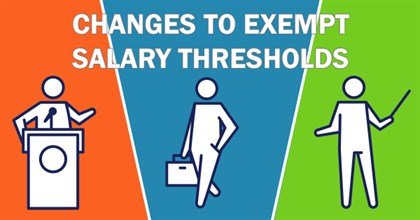
Compliance updates, analysis, plus HR and payroll best practices from HR One
 |
The U.S. Department of Labor (DOL) has announced pivotal changes to the federal salary thresholds for overtime exemptions under the Fair Labor Standards Act (FLSA), which are set to reshape compensation practices across the United States substantially. However, for business owners in New York, it's crucial to focus on the more stringent state regulations that surpass these federal adjustments for the executive and administrative exemptions.
Exempt vs. Non-Exempt Overview
In employment regulation, the distinction between exempt and non-exempt employees is crucial for determining eligibility for overtime pay.
|
Exemption |
Executive Exemption |
Administrative |
Professional |
|
Examples |
Executives, managers, store managers, department heads, shift supervisor |
Paralegals, healthcare administrators, marketing, public relations professionals, financial analysts. |
Doctor, lawyer, nurse, accountant,scientist, engineer |
|
The above are examples for illustrative purposes only and are not all-inclusive. Each individual position needs to be reviewed to see if it meets the requirements for an exemption. |
Understanding the criteria that distinguish these classifications helps employers comply with labor regulations and manage payroll effectively.
Federal Changes
To clearly understand the scope of the federal changes to overtime salary thresholds, please refer to the accompanying table below. This table outlines the incremental increases set to take effect over the coming years, highlighting the key dates and changes. Readers should note the discrepancy between the new federal standards and existing state standards.
2024
|
Exemption |
New Federal Minimum Weekly Salary |
NYS Minimum Weekly Salary |
|
Executive |
$684.00 to $844.00 ($35,568 to $43,888 annually) |
$1,200.00 (Downstate)/($62,400 annually) |
|
Administrative |
$684.00 to $844.00 ($35,568 to $43,888 annually) |
$1,200.00 (Downstate)/($62,400 annually) |
|
Professional |
$684.00 to $844.00 ($35,568 to $43,888 annually) |
|
|
Highly Compensated |
$107,432 to $132,964 |
|
2025
|
Exemption |
Federal Minimum Weekly Salary Effective January 1, 2025 |
NYS Minimum Weekly Salary Effective January 1, 2025 |
|
Executive |
$1,128.00 ($58,656 Annually) |
$1,237.50 (Downstate)/($64,350 annually) |
|
Administrative |
$1,128.00 ($58,656 Annually) |
$1,237.50 (Downstate)/($64,350 annually) |
|
Professional |
$1,128.00 ($58,656 Annually) |
|
|
Highly Compensated |
$151,164 |
|
Exisiting New York State Standards
This means that while the federal increase is notable, it does not supersede New York’s more demanding thresholds for the executive and administrative exemptions. Employers must comply with the highest applicable standard, which in this case is dictated by the state. Understanding and adhering to these rules is essential to avoid costly compliance issues and to ensure fair compensation practices.
However, because New York does not have a separate threshold for the Professional exemption or the Highly Compensated Employee exemption, any employees classified as such will be impacted by the federal change.
Anticipated Legal Challenges
Additionally, employers should be aware that these federal rule changes are likely to face legal challenges, which may delay their implementation. Historical precedents show that significant shifts in labor regulations often lead to judicial reviews, which can alter the final outcome or impact the enforcement timeline. Businesses should stay informed through reliable resources and professional advisement to navigate these uncertainties effectively.
Conclusion
Hopefully, this change will not be as disruptive for employers in New York since, for the most part, they should already be in compliance with the new federal rules for the professional and administrative exemptions. Staying informed about both federal and state regulations is crucial. However, here are a few best practice compliance tips to make sure you’re following the rules: